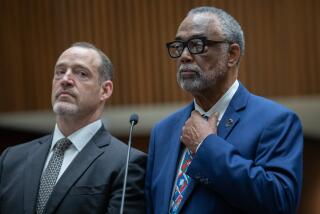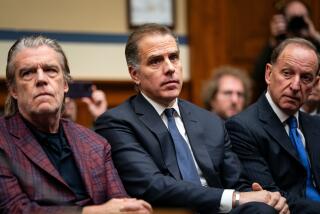Rizzo, Spaccia discussed falsifying tax returns, prosecutor says
Former Bell administrators Robert Rizzo and Angela Spaccia had companies that they used to lower the taxes they owed on the extraordinary salaries they earned in the small, working-class city, a prosecutor said Friday.
L.A. County Assistant Dist. Atty. Sean Hassett said the two former officials exchanged emails in which they discussed “falsifying their returns.”
Rizzo’s attorney has said he expected federal prosecutors to charge his client and Spaccia with conspiracy to file fraudulent tax filings. Court documents show that an accountant in an alleged tax fraud with Rizzo and Spaccia pleaded guilty this year.
When they left the Southeast Los Angeles County city in 2010, Rizzo was earning $1.18 million a year, and Spaccia was making $564,000 annually.
The alleged tax fraud was mentioned only briefly in court as Spaccia continues to defend herself on 13 corruption-related charges.
But documents filed in Los Angeles federal court show prosecutors have been working on the tax case since at least October 2012, when accountant Robert J. Melcher was charged with aiding and abetting the filing of a false tax return. He pleaded guilty in February and is awaiting sentencing.
The charging document says Melcher prepared a false tax return for “A.S” for 2006, failing to report income she received from the sale of rental property.
The U.S. attorney’s office declined to comment, and the accountant couldn’t be reached.
Rizzo’s attorney, James Spertus, a former federal prosecutor, said Friday that if a federal grand jury indicts Spaccia, more details will probably be revealed.
Spertus has called Spaccia the mastermind of the far-flung corruption in Bell. “The issue of who was really driving things really comes out in the tax case,” he said.
Harland Braun, Spaccia’s attorney, said he knew little about the tax case against his client and nothing about the emails. He did say that he has told federal authorities that his client would talk to them.
Spaccia contends that she didn’t know about the corruption and that it was driven by Rizzo.
On the witness stand Friday, Spaccia discussed her final days in Bell and neighboring Maywood, where she served as the acting city manager.
She said she considered committing suicide, and was admitted to a psychiatric hospital after she was forced out in Bell and dismissed in Maywood.
Spaccia said that after taking the job in Maywood, she started sleeping with a gun because she felt threatened by the gangs and city police officers whom she perceived to be corrupt.
“I didn’t know what was going to happen,” she said.
To put her at ease, she said Rizzo offered to give her a raise and promised to send someone else to govern the troubled town. She said a replacement never arrived
Spaccia also testified that she was certain that police Chief Randy Adams’ $457,000 salary would become public. “Inevitably, somebody would want to see his contract, and he was going to have some explaining to do,” she testified.
She said Adams was worried that the phrase “pay period” in his contract was not defined.
In a 2009 email, Spaccia wrote Adams: “We have crafted our Agreements carefully so we do not draw attention to our pay. The word Pay Period is used and not defined in order to protect you from someone taking the time to add up your salary.”
Spaccia said they had been negotiating for about a month, and Adams kept coming up with more changes.
“I was very annoyed,” she said.
Prosecutors say the phrasing of Adams’ contract shows Rizzo and Spaccia were trying to conceal the police chief’s high salary.
More to Read
Start your day right
Sign up for Essential California for news, features and recommendations from the L.A. Times and beyond in your inbox six days a week.
You may occasionally receive promotional content from the Los Angeles Times.








